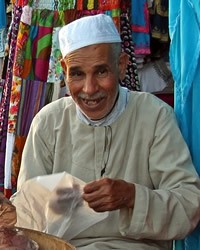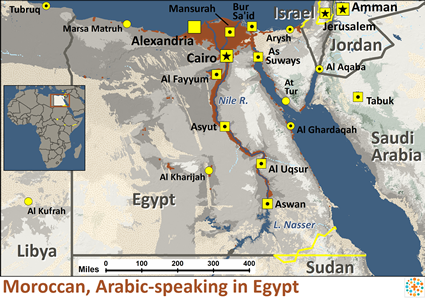The ancestors of the Moroccan Arabs originated in the Arabian Desert. From there, they gradually migrated into northern Africa. Over the centuries, the Arabs have become somewhat intermingled with the Berbers, and this has influenced their way of life, their language, and their culture. Nevertheless, the two groups have remained distinct.
Socially, there are two contrasting groups of Moroccan Arabs: those living in the cities and those in the rural areas. Several classes have formed among the rural Arabs, which include nobles (alleged descendants of Mohammed), large landowners, peasants, and tenant farmers. The Moroccan Arab live mainly in the north and west portions of Morocco. However, they prefer living in the more fertile regions near the Mediterranean Sea. The Moroccan Arabs make up less than half of the country's population. Their language is called Maghribi.
Some have migrated to other parts of the world in search of jobs, especially countries in Europe. Others have taken their job search to Egypt.
Moroccan Arabs share an Arab heritage with the majority people of Egypt, but the two cultures are on different ends of North Africa. Morocco and Egypt are 2200 miles apart, and they speak different forms of Arabic. Moroccan Arabic is different from Egyptian Arabic, which is the standard form of Arabic. Yet most Moroccans are familiar with Egyptian Arabic since that is what they hear on TV and radio. The JESUS Film is in both forms of Arabic.
Arab society is both patriarchal (male-dominated) and patrilineal, which means that the male lineage is given more honor and all inheritances are passed down through the males. Moroccan Arab women and men have distinct jobs. Traditional roles still exist, but they are being influenced by western culture. The Moroccan Arabs who live in Egypt are numerous, so you can't say they hold only one kind of job.
Life for the Moroccan Arabs, even those who have migrated to Egypt, centers on important ceremonies such as birth, marriage, and death. A boy also celebrates his first haircut and circumcision. The most elaborate of all ceremonies is the wedding. To preserve their people, the Moroccan Arabs only marry those inside their own group.
Maintaining their identity while being surrounded by European culture is very important to many Moroccan Arabs.
Virtually all of the Moroccan Arabs in this region are Sunni Muslim. They adhere to the Koran and observe the five basic "pillars" of Islam, which include affirming that there is no God but Allah, and Mohammed is his prophet; praying five times a day while facing Mecca; giving alms generously; fasting during Ramadan, the ninth month of the Muslim year; and trying to make at least one pilgrimage to Mecca.
Few Moroccan Arabs in this region are Christian. Pray they will be faithful to the Scriptures and eager to share their faith.
Pray that God will call forth teams of intercessors who will faithfully stand in the gap for Moroccan Arabs in Egypt.
Ask the Lord to raise up strong local churches among the Moroccan Arabs in Egypt.
Pray for the JESUS Film to become widely available to Moroccan Arabs in Egypt.
Ask the Holy Spirit to soften the hearts of the Moroccan Arabs to Christian materials like the JESUS Film and the Bible.
Ask the Holy Spirit to give Moroccan Arab believers boldness to share the love of Christ with their friends and families.
Scripture Prayers for the Arab, Moroccan in Egypt.
http://thecairopost.youm7.com/news/119164/news/moroccans-in-egypt-protests-against-anchor-who-insulted-king-mohammed-vi
http://forum.wordreference.com/threads/the-difference-between-arabic-dialects-is-as-big-as.1654180/
| Profile Source: Global Prayer Digest |


























